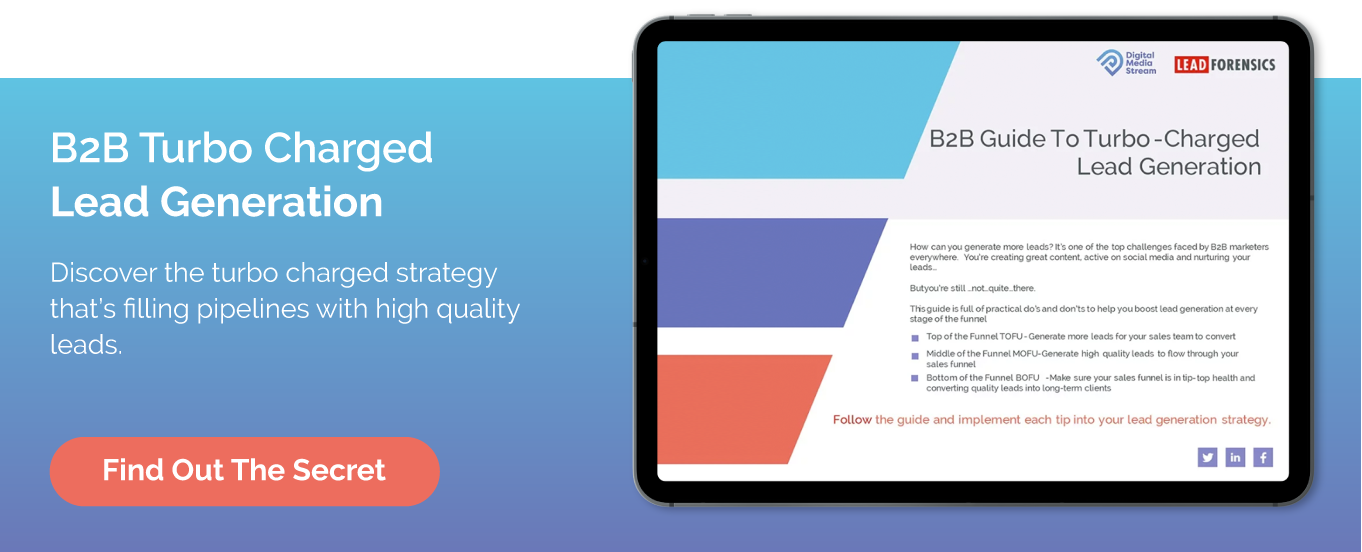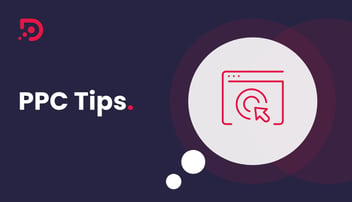The best B2B Lead Generation campaigns are built on a sturdy foundation of keyword analysis and buyer persona research, combining to produce content that delivers the right message, to the right audience, at the right time.
Keywords are the foundation on which your Content Marketing strategy is built. They have the power to boost your organic reach, visibility, traffic and rankings.
The right keyword strategy will attract more of the right type of traffic and help you build out cohesive topic clusters that boost your topical authority and provide every user with a delightful experience. By attracting the right type of traffic, you'll also boost your inbound lead generation more reliably and consistently.
By conducting keyword research, we are essentially choosing what phrases we will attempt to rank for on search engine results pages. It takes time, skill and strategy to identify the best keyword opportunities, and create content that satisfies user intent and search engine algorithms.
As Manchester's leading Content Marketing and SEO Agency, we've rounded up some of the best resources, insights and tips to help you find the keywords that will deliver business success (and generate great leads!)
The Anatomy of Lead Generation Keywords
Lead generation keywords come in all shapes and sizes; they can be long-tail, short-tail, plural or singular. There are three things to consider when researching your best keyword opportunities:
-
- Relevance to your product or service
- Competitive landscape (how difficult will it be to rank for the keyword?)
- The structure of the keyword: based on your specific target audience and their buyer's journey stage (intent)
This is all fair and well; the best keyword research tools indicate the difficulty, search volume and current SERP (Search Engine Results Page) real-estate.
Determining relevance is usually a matter of confirming - "Do I offer the product or service the user is looking for with this query?"
But before we can figure out what your prospective customers are searching for online, we need to really think about who is doing the actual searching. Who is your target customer? And how are they going to search for your content?
Identifying Your Target Customer: Buyer Keyword List
The example we will use is a company providing Leadership and Management training courses - we'll call them Acme. This business sells courses to individuals wanting to better their employment prospects and management skills, or business owners wanting to upskill their workforce.
Buyer Personas
We start by creating Buyer Personas. These are fictional, generalised representations of your ideal customer. Buyer Personas are often created via market research and insights from your actual customer base.
Buyer Personas make it easier for you to tailor content to the specific needs, behaviours, and concerns of different potential customer groups.
A business can have anything from 1 to 20 Buyer Personas depending on their business niche, customer base, and other factors. You only need one Buyer Persona to start with - and that is your ideal customer.
Introducing Acme's ideal customer - ‘Team Leader Tracey.' She works as a Team Leader for a small sales team. She wants to improve her prospects for promotion and jump the gap between Team Leader and Manager.
We will need to think about Tracey's personal profile, career goals and her challenges, both in her occupation and the barriers to purchase she may encounter when buying management training courses.

Team Leader Tracey
-
- Current role: Team Leader
- Age: 25-35
- Hard worker, self improver
- Goals: To improve prospects for a promotion and pay rise
- Barriers: Struggling to jump the gap between her current role and the next
The next step in creating your buyer persona is to consider what questions Tracey might ask when researching how to get a promotion at work.
What questions will she ask herself or look to the internet for answers to? These questions can come from any stage of the buyer journey and will be used to build out your 'buyer keyword list' that you will use to conduct your keyword research.
A great way to come up with questions your audience might be asking is to use tools like Answer the Public and AlsoAsked. When you type in the phrase ‘become a manager’ these tools generate a visual display of frequently asked questions that will guide you in formulating your very own buyer keyword list.
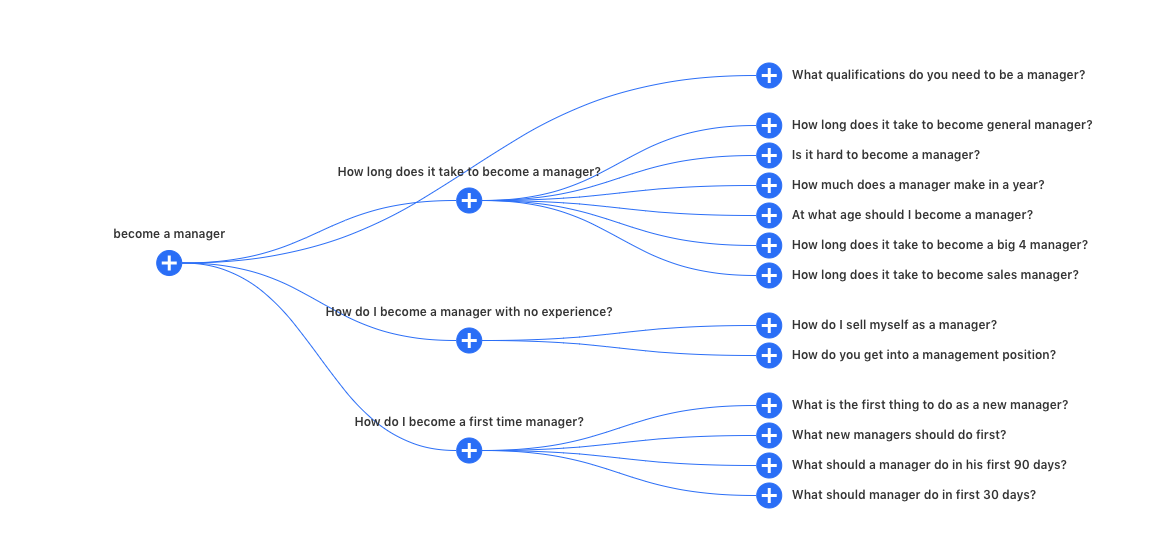

Once you've created a Buyer Persona and a buyer keyword list, be sure to keep them somewhere they can be easily referenced, amended and stored. You can always revisit them as your strategy evolves.
The Buyer Persona is essential to help you better understand your customer. Many of the questions you anticipate they may ask through each stage of their journey will provide the basis for your keyword strategy. Knowing the intent behind each keyword search will help you to create content that gives them the answers they're looking for. It also helps ensure you're the first brand they deal with, the one they trust, and the one they end up doing business with.
Now we have an idea of who our customers are and what they'll be searching for online, we can begin the hard work. We'll be doing a walkthrough of how to go about researching keywords and phrases they're most likely to use during their searches and analysing them to choose the ones our campaign will centre around.
Keyword Research Basics

There are several steps to come up with optimised keyword ideas - but the first thing to do is to come up with some options for yourself!
Off the top of my head, I can come up with a list of keywords that I have derived from my Buyer Persona and made note of in my buyer keyword lists, including:
-
- Cost of management training
- Management training courses
- Funding for management training
- Benefits of management training
You can type these phrases into Google and its Autocomplete feature will give you similar phrases that are most searched. You'll probably have seen some of these from your previous research using AlsoAsked and AnswerThePublic.
You can also scroll to the bottom of your Google search results page to see the list of related searches based on your current search term.
By typing in ‘Management Courses’ - we can identify and later research other popular iterations.
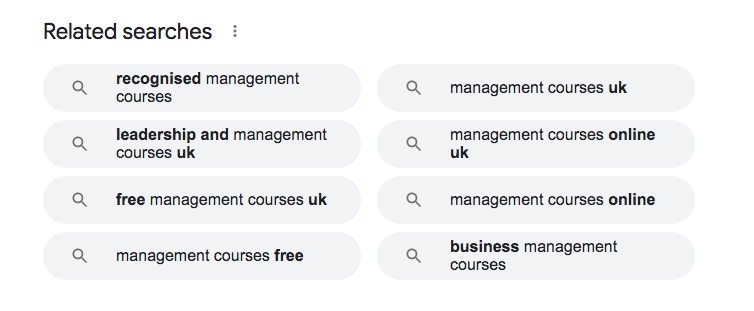
You could also try tools such as 'Ubersuggest' and 'KeywordTool.io'.
Below, I have used the latter. This site lets you specify searches by country so the output will be relevant.
By searching ‘management tips’, I found 327 unique keywords, all of which you can copy onto your clipboard at the click of a button.
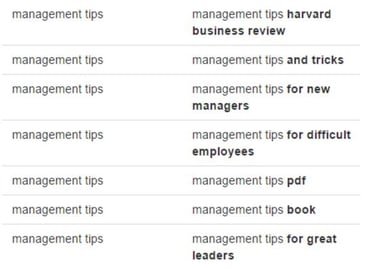
Once you have used these tools to come up with a list of potential keywords, you can work on refining this list to choose the most relevant, searchable and realistically competitive keywords.
Refining your Keyword List
Refine your Keywords
First up is to remove the duplicates and irrelevant keywords that may have made their way onto your list.
"how to become a manager at mcdonald's" might contain the right keywords, but is it relevant to Tracey's search - and is Acme offering courses that will help employees at McDonald's get a managerial promotion?
It’s time to find out how useful these keywords will be in making your content visible and directing the right type of organic traffic to your website.
You can use a tool called Raven to find out the monthly search volume for each keyword, along with the difficulty score, which tells you how hard it will be for you to rank highly for this keyword. Just paste your list of keywords and add them to the keyword manager.

With many keywords having monthly search volumes in the tens of thousands, I would usually delete any keyword will a search volume lower than 150, as the reward for ranking highly won't be worth the effort to get there.
In most keyword research tools, keyword difficulty will be rated on a scale of 1-100. A difficulty score of higher than around 65 is usually not worth trying to rank for at first; with a robust long-term keyword strategy, it's possible, but starting with low difficulty, high volume searches is the best way to go
You should now have a smaller list of relevant, popular keywords to choose from.
Choosing your Keywords
We're now ready to choose the keywords we’ll be focusing on for our campaign.
Lead Generation Keywords For Each Stage of The Buyers Journey
Your target keywords should be a mix of low difficulty, high volume monthly searches. We also need to think about what stage of the buyer's journey Tracey will be in when typing these phrases into a search engine.
We'll want to choose keywords from each stage of the buyer's journey in order to create content for Tracey that supports her from the moment she enters her first search, to the moment she decides to buy a management training course.
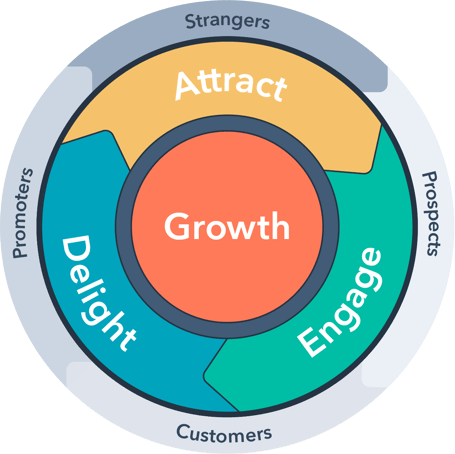
Attraction/Awareness Stage Lead Generation Keywords
In this stage, Tracey may be unaware of management training courses altogether. She knows she has a problem, but she doesn't know how to solve it.
Keywords for this category will reflect that Tracey is just looking for information on achieving the goal I identified during buyer persona research: to get promoted.
-
-
- How can I get promoted?
- How to get a promotion in management
- Steps to get promoted at work
-
Convert/Consideration Stage Lead Generation Keywords
In this stage, Tracey may be aware of management training courses - but she's unsure of where to go to get one, or whether they are useful and relevant for her.
She'll now need supporting information to help her decide if this is worth her while.
-
-
- Can a management training course help me get promoted?
- Why should I sign up for management training course?
-
-
-
- Will a management training course benefit my CV in the future?
- Benefits of management training courses
-
Decision/Close Stage Lead Generation Keywords
When a potential customer is ready to make a decision, they're likely already aware of your business and might even be. returning site visitor.
They might be comparing your business to others, looking for the best quality or pricing points on offer, and are probably looking for social proof that other customers have achieved their own goals using your services.
This stage should include content that helps Tracey make an informed decision; she needs to feel assured that by choosing to enrol on a management course with Acme, she'll walk away with credentials that will help her get her promotion.
You'll also want a 'clincher' in this type of content. Something that adds value, and helps her cross the line. Assessments, consultations, and testimonials work excellently for decision stage lead generation content.
-
- Which management training course is right for me?
- Management training course cost
- Is there any funding available for management courses?
Content Strategies That Support Keywords for Lead Generation
We know who our ideal customer is; we know what questions she will need to have answered, we know which keywords we should include, and we know that we have a mountain of content to write if we want to get our content front-and-centre of her search.
Your keywords can be clustered together to create a network of related blogs; this methodology is referred to as topic clusters and is a vital part of Inbound Marketing.
The overarching principle of topic clusters is to group together related topics and have them link out to content across each stage of the buyer's journey.
For example; management training is our core topic. It has a search volume of 1300 monthly searches and a difficulty score of 33 - which is relatively low.
Our strategy will include content that supports Tracey across her awareness, consideration, and decision stages.
Now for the fun part; creating catchy content titles that will compel Tracey to click on Acme's content.
-
-
- Will Management Training Help You Get Promoted?
- 5 Surefire Ways To Increase Your Chances of Being Promoted
- The Costs of Management Training: Is It Worth It?
- Which Management Training Course Is Right For You?
- 7 Less Obvious Benefits of Management Training
- The 3 Management Training Skills Top Employers Look For
-
Once you've created the best possible titles, you can get to work on your copywriting, optimisation and promotion of your content,
You can also utilise your new content in email marketing automation workflows to nurture top-of-the-funnel leads through the buyer's journey more effectively.
Inbound Marketing is a combination of many digital services; from content marketing through to marketing automations and growth-driven web design, it utilises every bit of the marketing matrix to create a brand experience that makes people want to be your customer. Inbound is a cost-effective way to attract, engage, convert and delight more leads and customers.
If you're ready to elevate your lead generation, increase your traffic and grow your sales funnel - we can help.
Take a look at our HubSpot services and Lead Generation service offerings, or book a free consultation with our Lead Generation experts now.


